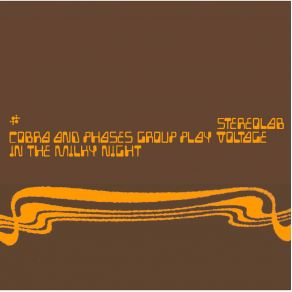Cobra and Phases Group Play Voltage In the Milky Night
Download links and information about Cobra and Phases Group Play Voltage In the Milky Night by Stereolab. This album was released in 1999 and it belongs to Electronica, Jazz, Rock, Indie Rock, Pop, Alternative genres. It contains 15 tracks with total duration of 01:15:21 minutes.

|
|
|---|---|
| Artist: | Stereolab |
| Release date: | 1999 |
| Genre: | Electronica, Jazz, Rock, Indie Rock, Pop, Alternative |
| Tracks: | 15 |
| Duration: | 01:15:21 |
| Buy it NOW at: | |
| Buy on iTunes $9.99 | |
| Buy on Amazon $9.49 | |
| Buy on Amazon $16.42 | |
| Buy on Amazon $26.98 | |
| Buy on Amazon $44.95 | |
| Buy on iTunes $9.99 | |
| Buy on Songswave €2.13 | |
Tracks
[Edit]| No. | Title | Length |
|---|---|---|
| 1. | Fuses | 3:37 |
| 2. | People Do It All the Time | 3:41 |
| 3. | The Free Design | 3:47 |
| 4. | Blips, Drips and Strips | 4:27 |
| 5. | Italian Shoes Continuum | 4:34 |
| 6. | Infinity Girl | 3:53 |
| 7. | The Spiracles | 3:40 |
| 8. | Op Hop Detonation | 3:32 |
| 9. | Puncture In the Radak Permutation | 5:48 |
| 10. | Velvet Water | 4:21 |
| 11. | Blue Milk | 11:28 |
| 12. | Caleidoscopic Gaze | 8:08 |
| 13. | Strobo Acceleration (LP Version) | 3:54 |
| 14. | The Emergency Kisses | 5:53 |
| 15. | Come Andy Play In the Milky Night | 4:38 |
Details
[Edit]Stereolab took an unprecedented two years between 1997's Dots & Loops and 1999's Cobra and Phases Group Play Voltage in the Milky Night, as they tended to personal matters. For a band that churned out limited-edition singles and EPs, along with an annual album, between 1992 and 1997, complete silence was a complete change of pace, but they happened to pick a good time to go into seclusion. During those two years, Stereolab's brand of sophisticated, experimental post-rock didn't evolve too much, even as their peers, colleagues, and collaborators tried other things: Tortoise got jazzier with TNT, Jim O'Rourke got irresistibly lush and complex with Bad Timing and Eureka, while the High Llamas fleshed out Sean O'Hagan's Beach Boys fetish with 'Lab highlights on Cold and Bouncy. With the exception of O'Rourke, who abandoned Gastr Del Sol's minimalism for grandiosity, they all offered slight expansions of what they did before instead of making great progress. Since each Stereolab album has offered a significant progression from the next, it would have been fair to assume that when they returned with Cobra, it would have been a leap forward, especially since it was co-produced with Tortoise's John McEntire and O'Rourke. Perhaps that's the reason that the album feels slightly disappointing. The group has absorbed McEntire's jazz-fusion leanings — "Fuses" kicks off the album in compelling, free-jazz style — and the music continually bears O'Rourke's attention to detail, but it winds up sounding like O'Hagan's increasing tendency of making music that's simply sound for sound's sake. Cobra may seem that way because its pacing is off, with the first half of the album filled with concise numbers that give way to the lengthy "Blue Milk" and "Caleidoscopic Gaze" toward the end; after those two set pieces, it snaps back into succinct mode for the final three songs. Throughout it all, Stereolab's trademarks remain in place, but they're augmented by rhythms, harmonies, horn arrangements, dissonance, muted trumpets, and electric keyboards all out of jazz from the late '60s, whether it's bossa nova or fusion. All fascinating in theory and often in practice, but Cobra still winds up being less than the sum of its parts. Maybe it's because the longer pieces drift, instead of hypnotize or develop; maybe it's because the songs sound like afterthoughts to the arrangements (a criticism leveled at Stereolab before but never really applicable until now); maybe it's just because of the odd pace of the album. In any case, Cobra never hits its stride, even as it offers a few miniature masterpieces along the way. Perhaps the time off led to the slight lack of focus, since many moments of the album illustrate that Stereolab is as fascinating as ever. But as an album, Cobra is their first record since Transient Random Noise Bursts to not be fully realized.